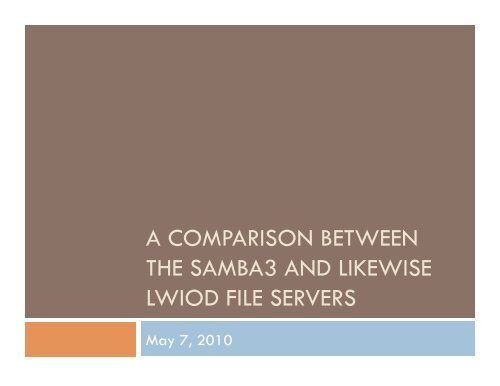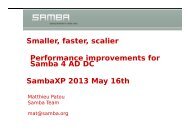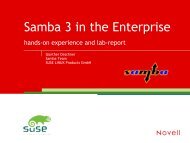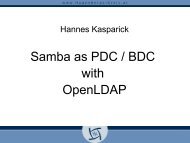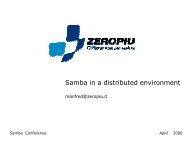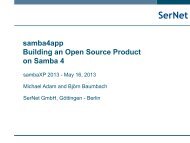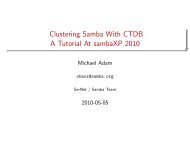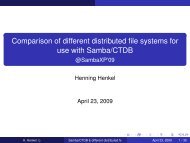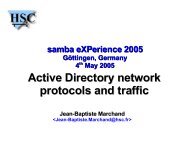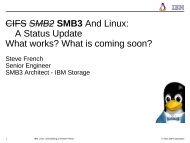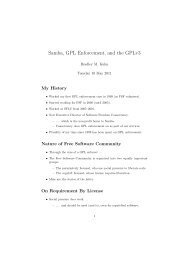Comparison_smbd_vs_l.. - Steven Danneman
Comparison_smbd_vs_l.. - Steven Danneman
Comparison_smbd_vs_l.. - Steven Danneman
You also want an ePaper? Increase the reach of your titles
YUMPU automatically turns print PDFs into web optimized ePapers that Google loves.
A COMPARISON BETWEEN<br />
THE SAMBA3 AND LIKEWISE<br />
LWIOD FILE SERVERS<br />
May 7, 2010
Outline<br />
Overview<br />
Architecture<br />
Feature Set<br />
Administrator Perspective<br />
Developer Perspective
Overview<br />
18 years development<br />
GPLv3<br />
Personal copyright<br />
www.samba.org<br />
1.5 years development<br />
GPLv2+<br />
Corporate copyright<br />
www.likewiseopen.org
<strong>Comparison</strong><br />
Git “master” branches as of April 17, 2010<br />
Focus on file server functionality<br />
Focus on Linux platform<br />
Only small discussion of:<br />
Samba 4<br />
winbindd<br />
lsassd<br />
No discussion of:<br />
Clustering
SMBD Architecture<br />
<br />
Multi-Process<br />
<br />
Single Threaded<br />
New<br />
Connection<br />
Persistent<br />
Connections<br />
SMBD<br />
Parent<br />
Child<br />
Protocol<br />
Child<br />
Protocol<br />
VFS<br />
VFS<br />
Blocking<br />
Syscalls<br />
Kernel
LWIOD Architecture<br />
<br />
<br />
Single Process<br />
Multi-Threaded<br />
New & Persistent<br />
Connections<br />
LWIOD<br />
T<br />
T<br />
Protocol<br />
T<br />
VFS<br />
T<br />
T<br />
T<br />
Blocking<br />
Syscalls<br />
Kernel
Problem Classes<br />
Single Stream Read/Write<br />
Blocking Operations<br />
Truncate of large file<br />
Simultaneous Sessions<br />
IIS / Terminal Server<br />
Connection Throttling
Single Stream Read/Write<br />
+ Simple, direct, I/O<br />
+ Pipelined network I/O<br />
written in parallel<br />
- Thread context switch<br />
overhead<br />
<br />
<br />
Depends on client network pipelining. Windows Vista or greater.<br />
Depends on kernel I/O interface: read()/write(), aio, sendfile(), splice().
Blocking Operations<br />
- Network and file<br />
system interfaces are<br />
serialized<br />
+ Parallel syscalls<br />
+ Network I/O not<br />
blocked by file system<br />
operations<br />
+ Greater responsiveness<br />
<br />
Extreme case: ECHO packets go unresponded and client disconnects.
Simultaneous Sessions<br />
- I/O of user2 blocked<br />
by user1from same<br />
client<br />
+ All network I/O<br />
serviced in parallel<br />
<br />
Windows SMB client implementation multiplexes multiple sessions over single<br />
transport connection.
Connection Throttling<br />
+ “max <strong>smbd</strong> processes”<br />
- No distinction between idle<br />
and active connections<br />
- New connection<br />
degradation all or nothing.<br />
+ New connections limited by<br />
same thread pool as all<br />
other operations
Architecture Conclusion<br />
LWIOD should solve a number of scalability issues in<br />
specific workflows.<br />
More graceful degradation under load.<br />
LWIOD should have less total resource utilization.<br />
Multi-threaded model forfeits some POSIX support.<br />
Kernel access checks<br />
fcntl() locking
Feature Set<br />
SMBD<br />
LWIOD<br />
SMB Dialect
SMB Protocol Dialect / NetBios<br />
+ Unix Extensions<br />
+ SNIA Reference support<br />
- Unsupported:<br />
- Port 139<br />
- NT4 clients<br />
- OS X
SMB2<br />
SMB v1 equivalent support in both.<br />
SMB2 2.002 == Windows Vista / 2008 Server<br />
No SMB2 only features:<br />
Durable / Resilient Handles<br />
Leases<br />
Credits
Share Mode / Oplock / Change Notify<br />
+ Linux kernel oplock<br />
partial support<br />
+ Linux kernel notify<br />
support<br />
Both: Functionality implemented in user space.<br />
No cross-protocol support without kernel implementation.
Byte Range Locks<br />
+ Can back with POSIX<br />
locks<br />
Both: Implement Windows locking semantics in user space.<br />
Both: Use user space queue that doesn’t guarantee fairness.<br />
Both: Provide strict locking semantics for SMB only traffic.
Access Control Lists<br />
SMBD<br />
LWIOD<br />
Access Checks Kernel User Space<br />
Storage in Xattr<br />
Map to Mode Bits<br />
Map to POSIX ACL<br />
Map to NFSv4 ACL<br />
NT4 Style ACL<br />
SMBD: xattr storage AND POSIX ACL<br />
LWIOD: xattr storage OR mode bits<br />
O
Access Control Lists<br />
o Best choice:<br />
+ Perfect POSIX support<br />
+ Perfect Windows<br />
+ get/set<br />
- Imperfect Windows<br />
- access check<br />
o Best choice:<br />
+ Perfect Windows<br />
support<br />
- No POSIX support
Access Control Lists<br />
Both: Lossy conversion between NTFS ACL and mode<br />
bits / POSIX ACL<br />
RWX != Full Control<br />
Groups owning files<br />
Deny aces and canonical order<br />
Both: Rely on SID to Unix ID mapping<br />
Unmappable SIDs can’t be stored<br />
NTFS ACLs to POSIX sucks no matter what you do!
Alternate Data Streams<br />
+ ADS storage in hidden<br />
subdirectory tree<br />
+ ADS storage in xattrs<br />
- Support for ::$DATA<br />
stream only
Shadow Copy<br />
+ Allows enumeration /<br />
restore<br />
+ Conversion of wire<br />
name to directory name<br />
- POSIX VFS module<br />
lacks enumeration /<br />
restore<br />
<br />
<br />
Both: Support parsing of @GMT path format in protocol head.<br />
Both: Rely on underlying file system to implement snapshots.
Feature Set (continued)<br />
Sr<strong>vs</strong>vc<br />
DOS File Attributes<br />
Distributed File System<br />
Signing / Sealing<br />
Privileges<br />
Auditing<br />
IPv6<br />
Copy Chunk<br />
SMBD<br />
O<br />
O<br />
LWIOD
Non-File Server Functionality<br />
Printing / spoolss<br />
NetBios Name Server<br />
NT4 Domain Server<br />
Active Directory Server<br />
SMBD<br />
O<br />
LWIOD
Feature Conclusion<br />
SMBD far more mature in number of features.<br />
No technical reason for lack of features in LWIOD<br />
simply a matter of development time and effort.<br />
LWIOD supports newer clients only.<br />
Some features cannot be perfectly duplicated on<br />
POSIX regardless of server implementation.<br />
ACLs<br />
BRL
Administrating / Configuration<br />
o Stored in .ini text file<br />
o 374 Total Parameters<br />
o 146 Share Parameters<br />
o Alternate registry<br />
configuration storage<br />
o Stored in registry<br />
o 14 Parameters (lwiod only)<br />
+ MMC support by default<br />
- Examples of missing config:<br />
- Access based enum<br />
- Share path substitution<br />
- Name mangling
Developer Perspective<br />
Both: Provide division between protocol marshalling<br />
and kernel file system interface.<br />
Both: OEM’s task is to implement a VFS module<br />
Wildly different coding style
SMBD VFS<br />
Hybrid Interface<br />
POSIX / NTFS / Other<br />
113 functions<br />
Chained modules<br />
Protocol Head<br />
SMB<br />
SMB2<br />
OS specific modules<br />
irixacl, hpuxacl, zfsacl<br />
VFS API<br />
~30 modules<br />
ACL<br />
Streams<br />
POSIX<br />
Partial API
LWIOD VFS<br />
IOMGR Interface<br />
Abstract Device Driver API<br />
16 functions<br />
Includes IOCTL<br />
Every call can go async<br />
No chaining or filtering<br />
Generic POSIX module<br />
No OS specific functionality yet<br />
Reference implementation<br />
Protocol Head<br />
SMB SMB2<br />
VFS API<br />
POSIX<br />
<br />
1 Module
Questions?<br />
Contact<br />
<strong>Steven</strong> <strong>Danneman</strong><br />
sdanneman@isilon.com<br />
steven@samba.org


